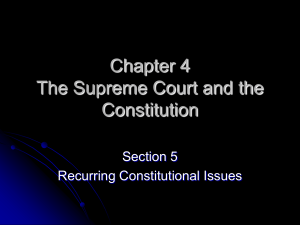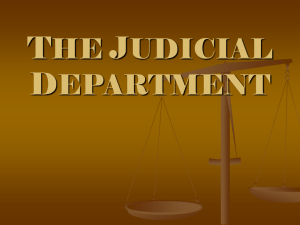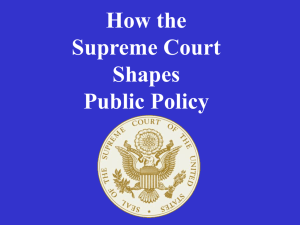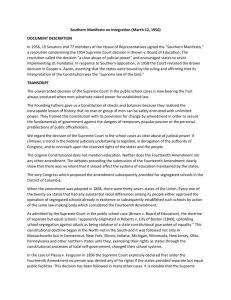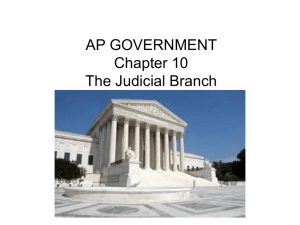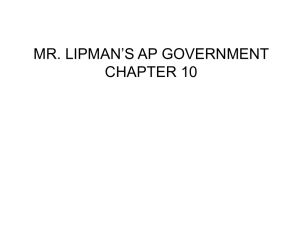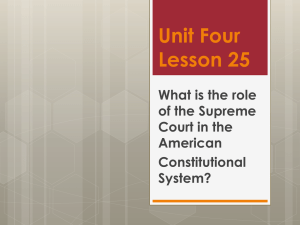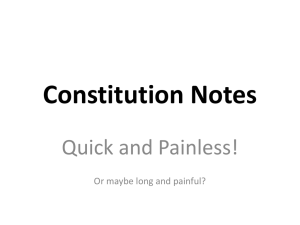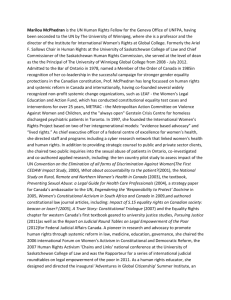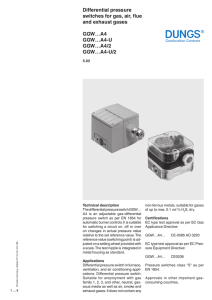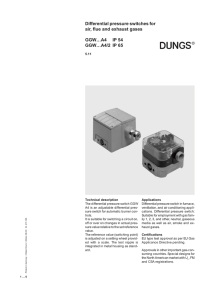PSC 5433 American Constitutional Development University of
advertisement
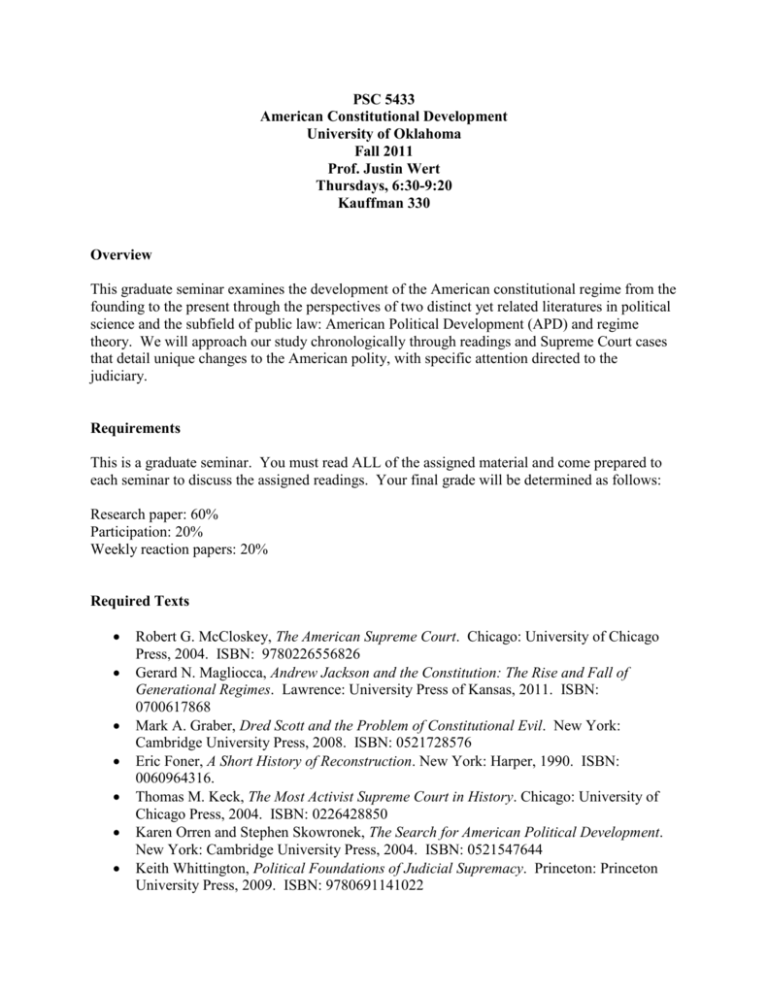
PSC 5433 American Constitutional Development University of Oklahoma Fall 2011 Prof. Justin Wert Thursdays, 6:30-9:20 Kauffman 330 Overview This graduate seminar examines the development of the American constitutional regime from the founding to the present through the perspectives of two distinct yet related literatures in political science and the subfield of public law: American Political Development (APD) and regime theory. We will approach our study chronologically through readings and Supreme Court cases that detail unique changes to the American polity, with specific attention directed to the judiciary. Requirements This is a graduate seminar. You must read ALL of the assigned material and come prepared to each seminar to discuss the assigned readings. Your final grade will be determined as follows: Research paper: 60% Participation: 20% Weekly reaction papers: 20% Required Texts Robert G. McCloskey, The American Supreme Court. Chicago: University of Chicago Press, 2004. ISBN: 9780226556826 Gerard N. Magliocca, Andrew Jackson and the Constitution: The Rise and Fall of Generational Regimes. Lawrence: University Press of Kansas, 2011. ISBN: 0700617868 Mark A. Graber, Dred Scott and the Problem of Constitutional Evil. New York: Cambridge University Press, 2008. ISBN: 0521728576 Eric Foner, A Short History of Reconstruction. New York: Harper, 1990. ISBN: 0060964316. Thomas M. Keck, The Most Activist Supreme Court in History. Chicago: University of Chicago Press, 2004. ISBN: 0226428850 Karen Orren and Stephen Skowronek, The Search for American Political Development. New York: Cambridge University Press, 2004. ISBN: 0521547644 Keith Whittington, Political Foundations of Judicial Supremacy. Princeton: Princeton University Press, 2009. ISBN: 9780691141022 Howard Gillman, Mark A. Graber, and Keith E. Whittington, American Constitutionalism (GGW), available here: http://www.princeton.edu/~kewhitt/GGW_6_11/ Reasonable Accommodation Any student in this course who has a disability that may prevent him or her from fully demonstrating his or her abilities should contact me personally as soon as possible so we can discuss accommodations necessary to ensure full participation and facilitate your educational opportunities. Class Schedule Week 1 8/25 Introduction & Overview: No readings (yet) Week 2: 9/1 No Class APSA Week 3: 9/8 APD, or, What do We Mean by American Political Development? Required: Karen Orren and Stephen Skowronek, The Search for American Political Development John Gerring, “APD from a Methodological Point of View,” Studies in American Political Development, 17 (Spring 2003), 82-102 Week 4: 9/15 Regime Theory Required: McCloskey, TASC, Ch. 1 Robert Dahl, “Decision-Making in a Democracy: The Supreme Court as a National Policy-Maker,” 50 Emory Law Journal 563, 2001 [1957] Rogers M. Smith, “Political Jurisprudence, the ‘New Institutionalism,’ and the Future of Public Law,” American Political Science Review, 82: 89-108 (1988) Cornell Clayton & David A. May, “A Political Regimes Approach to the Analysis of Legal Decisions,” Polity, Vol. 32, no. 2, (1999) Thomas M. Keck, “Party, Policy, or Duty: Why Does the Supreme Court Invalidate Federal Statutes?” American Political Science Review, 101: 321-338 (2007) Thomas M. Keck, “Party Politics or Judicial Independence? The Regime Politics Literature Hits the Law Schools,” Law & Social Inquiry, 32: 511-544 (2007) Recommended Richard Funston, “The Supreme Court and Critical Elections,” American Political Science Review 69: 795-811 (1975) John Gates, “The American Supreme Court and Electoral Realignment,” Social Science History 8:3: 267-290 (1984) Mitch Pickerill and Cornell Clayton, "The Rehnquist Court and the Political Dynamics of Federalism," Perspectives on Politics 2:2 (June 2004): 233-48 Week 5: 9/22 The Founding & The Bill of Rights GGW, Ch. 3 Akhil Amar, America’s Constitution: A Biography, Ch. 1 (D2L) Rogers M. Smith: Civic Ideals: Conflicting Visions of Citizenship in U.S. History, Ch. 5 (D2L) Akhil Amar, America’s Constitution: A Biography, Ch. 9 (D2L) Week 6: 9/29 Judicial Review and the Marshall Court Marbury v. Madison GGW, Ch. 4 McCloskey, TASC, Ch. 2 Mark Graber, "Federalist or Friend of Adams: The Marshall Court and Party Politics," Studies in American Political Development 12 (1998): 229-66 Mark Graber, “Establishing Judicial Review: Marbury and the Judicial Act of 1789," Tulsa Law Review 38 (Summer 2003): 609 Michael Klarman, "How Great Were the 'Great' Marshall Court Decisions?" Virginia Law Review 87 (October 2001):1111-1184 Jack Knight & Lee Epstein, "On the Struggle for Judicial Supremacy," Law and Society Review 30 (1996): 87-130. Sanford Levinson, "Why I Do Not Teach Marbury (Except to Eastern Europeans) and Why You Shouldn't Either." Wake Forest Law Review 38 (Summer 2003): 553. Week 7 10/6 Slavery and Jacksonian America Dred Scott v. Sanford GGW, Ch. 5 McCloskey, TASC, Ch. 3 Gerard N. Magliocca, Andrew Jackson and the Constitution: The Rise and Fall of Generational Regimes Mark A. Graber, Dred Scott and the Problem of Constitutional Evil Recommended: Robert Cover, Justice Accused: Antislavery and the Judicial Process Harold M. Hyman and William M. Wiecek, Equal Justice Under Law: Constitutional Development, 1835-1875 Stephen Skowronek, The Politics Presidents Make, chapter 5 William M. Wiecek, The Sources of Anti-Slavery Constitutionalism in America, 17601848 Sean Wilentz, The Rise of American Democracy Week 8 10/13 The Civil War and Reconstruction McCloskey, TASC, Ch.5 (Civil War sections) GGW, Ch. 6 Ex parte Merryman Ex parte Milligan The Slaughterhouse Cases Eric Foner, A Short History of Reconstruction Recommended: Pamela Brandwein, Reconstructing Reconstruction Earl M. Maltz, Civil Rights, The Constitution, and Congress, 1863-1869 William E. Nelson, The Fourteenth Amendment: From Political Principle to Judicial Doctrine Stephen Skowronek, The Politics Presidents Make, chapter 6 Week 9 10/20 The Gilded Age and Lochner Lochner v. New York McCloskey, TASC, Ch. 5 GGW, Ch. 7 Howard Gillman, "More on the Fuller Court's Jurisprudence: Reexamining the Scope of Federal Power Over Commerce and Manufacturing in Nineteenth-Century Constitutional Law," Political Research Quarterly 49 (June 1996): 415-37 Howard Gillman, "How Political Parties Can Use the Courts to Advance Their Agendas: Federal Courts in the United States, 1875-1891," American Political Science Review 96:3 (September 2002): 511-24 Recommended: Daniel Carpenter, The Forging of Bureaucratic Autonomy William Forbath, Law and the Shaping of the American Labor Movement Michael Klarman, From Jim Crow to Civil Rights, chapter 1 George Lovell, Legislative Deferrals Nell Irvin Painter, Standing at Armageddon: United States, 1877-1919 David Rabban, Free Speech in its Forgotten Years, chapters 1-4 Week 10 10/27 The Progressive Era McCloskey, TASC, Ch. 6 Howard Gillman, "Preferred Freedoms: The Progressive Expansion of State Power and the Rise of Modern Civil Liberties Jurisprudence." Political Research Quarterly 47 (September 1994): 623-53 Michael Klarman, “The Plessy Era,” Supreme Court Review 1998: 303. Recommended: David E. Bernstein, Only One Place of Redress: African Americans, Labor Regulations, and the Courts from Reconstruction to the New Deal Justin Crowe, "The Forging of Judicial Autonomy," Journal of Politics 69 (Feb. 2007): 73-87 Mark Graber, Transforming Free Speech: The Ambiguous Legacy of Civil Libertarianism William Ross, A Muted Fury Week 11 11/3 The New Deal and the Court-Packing Plan McCloskey, TASC, Ch. 6 (cont.) GGW, Ch. 8 Laura Kalman, "The Constitution, the Supreme Court, and the New Deal" (with responses by William Leuchtenburg and G. Edward White) Kevin J. McMahon, “Constitutional Vision and Supreme Court Decisions: Reconsidering Roosevelt on Race,” Studies in American Political Development, 14 2000: 20-50. Recommended: Robert Cover, "The Origins of Judicial Activism in the Protection of Minorities," Yale Law Journal 91 (June 1982): 1287-1316 Barry Cushman, Rethinking the New Deal Court Barry Friedman, The Will of the People, "Acceptance" (chapter 7) Ken Kersch, Constructing Civil Liberties William Leuchtenburg, "The Origins of Franklin D. Roosevelt's 'Court-Packing' Plan," Supreme Court Review (1966) 347-400 Julie Novkov, Constituting Workers, Protecting Women, "Gendered Rebalancing: Minimum Wages and the Battle over Equality" (chapter 5) Lucas Powe, The Warren Court and American Politics, "The Supreme Court, 1935-1953" (chapter 1) Stephen Skowronek, The Politics Presidents Make, chapter 7 Week 12 11/10 Brown v. Board and the Rise of Civil Rights & Civil Liberties Brown v. Board of Education McCloskey, Ch. 7 Robert Cover, “The Origins of Judicial Activism in the Protection of Minorities,” Yale Law Journal, 1982: 1287 Mary L. Dudziak, “Desegregation as a Cold War Imperative,” Stanford Law Review 41 (November 1988): 61-120 Michael Klarman, “Brown, Racial Change, and the Civil Rights Movement,” Virginia Law Review, Vol. 80, no. 7 (1994) Michael Klarman, “Rethinking the Civil Liberties and Civil Liberties Revolution,” Virginia Law Review 82: 1-68 (1996) Gerald Rosenberg, The Hollow Hope, Chs.1-5 Week 13 11/17 The Republican Realignment GGW, Chs. 9-11 US v. Lopez US v. Morrison McCloskey, TASC, Ch.9 Thomas M. Keck, The Most Activist Supreme Court in History Jack M. Balkin and Sanford Levinson, “Understanding the Constitutional Revolution,” Virginia Law Review 2001: 1045. Recommended: Barry Friedman, The Will of the People, chapter 9-10 Mitch Pickerill and Cornell Clayton, "The Rehnquist Court and the Political Dynamics of Federalism," Perspectives on Politics 2:2 (June 2004): 233-48 Andrew Rudalevige, The New Imperial Presidency (Michigan, 2005) Reva B. Siegel, “Dead or Alive: Originalism as Popular Constitutionalism in Heller.” Harvard Law Review 122 (November 2008): 191-245 Stephen Skowronek, The Politics Presidents Make, chapter 8 Stephen Skowronek, "The Conservative Insurgency and Presidential Power: A Developmental Perspective on the Unitary Executive," Harvard Law Review 122: 2070 (2009) Mark Tushnet, A Court Divided Steven Teles, The Rise of the Conservative Legal Movement Week 14 11/24 No Class Thanksgiving Week 15 12/1 Conclusion: APD, Regime Theory, and Constitutional Development Keith Whittington, Political Foundations of Judicial Supremacy Week 16 12/8 Research Presentations
